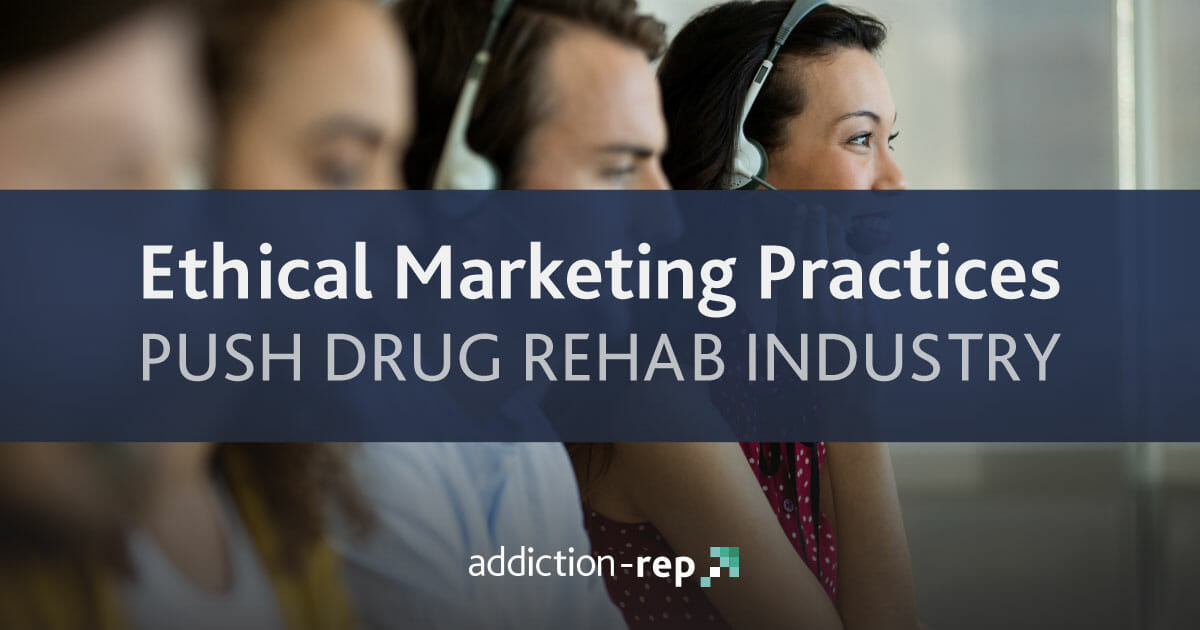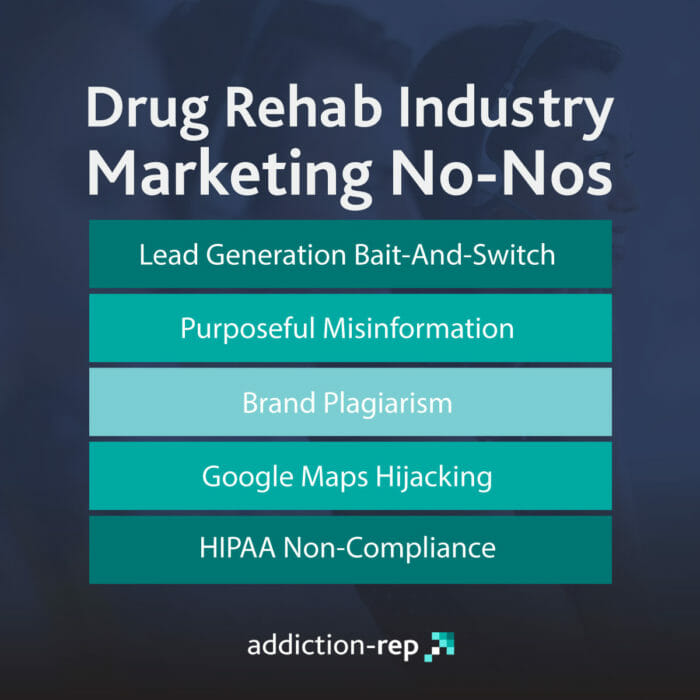Ethical Marketing Practices Push Drug Rehab Industry
Doing business well doesn’t always mean doing business right. Some say that’s just the way business gets done – even if ethical marketing practices are thrown out the window. But in the addiction rehab industry, business marketing practices drive admits, referrals and reputation management.
So if you’re doing what you do best, building your alcohol or drug rehab facility, who is minding your online marketing store? It might not be who you think.
In Lead Generation, Who’s Leading Who?
Every rehab company looks for ways to bring more business to its doors. If you’re not, you should be. Since most consumers, more than 70 percent, search online for information before they make a decision to purchase, your digital presence is more than important, it’s EVERYTHING. This also applies to the drug rehab industry. Here’s where it gets … shady.
While you are busting your you-know-what to get your business up, running and growing like crazy, your competitors in the drug rehab industry will go to great lengths to stop you from taking their market share. One way they can take business away from you is through lead generation bait-and switch. You pay a company to generate online leads for you or through a dedicated 1-800 phone number, but somehow those leads go to someone else – and you wouldn’t even know it. But there’s so much more.
Common Online Hacks that Ruin Drug Rehab Industry Perception
The fact that consumers need to use such content-verification systems as snopes.com to check on the accuracy of the information they see on the internet says a lot about digital marketing channels. It is what it is: Rehab marketing must live in the online space.
So how do we safeguard the drug rehab industry from fraudulent practices that undermine our integrity and prey off the vulnerabilities of the people who need our help most – our patients?
We must be vigilant in our knowledge, uphold ethical marketing practices and call out those who don’t comply.
Here’s what to watch for in online drug rehab marketing. Note how they overlap one another:
- Lead Generation Bait-and-Switch
- Purposeful Misinformation
- Brand Plagiarism
- Google Maps Hijacking
- HIPAA Non-Compliance
Lead Generation Bait-and-Switch
Rehab marketing is essential to the success of any addiction treatment facility. What can make this industry alliance go sideways is when the marketer is paid a commission for converting the lead. True, most effective salespeople work better when there’s commission involved. But this compromises the needs of the patient.
What can happen in this scenario, also known as patient brokering, is that the patient is convinced that they need the services of one particular company (hence, lead generation payout) that may not necessarily offer them the right services. The result is that the rehab marketer makes money, the rehab facility makes money, and the patient spends thousands of dollars (or through their insurance provider) only to return to the active addiction cycle.
This problem has become so prevalent in Florida that the state government created the Florida Patient Brokering Statute that lays out in detail what types of rehab business practices are prohibited. California has a similar statute in the works, with more states to follow.
Purposeful Misinformation in Ethical Marketing Practices
Shady gets shadier. Culpable deniability happens when a drug rehab business says it does one thing but truly only offers something else. If you provide detox, but that part of your program isn’t available onsite at your business, disclose that. If you treat adults with alcoholism but have a prospect calling inquiring about treatment for their 16-year old son, disclose that your services are for adults.
Disclosure is not simply meant for phone calls but across every marketing channel you subscribe to. This includes:
- Broadcast
- Television
- Radio
- Youtube
- Print
- Brochures
- Display Ads
- Outdoor Billboards
- Editorial/Press
- Digital
- eBooks
- Email Campaigns
- Website
- PPC
- Search Engine Presence
- Landing Pages
- App (descriptives)
Brand Plagiarism
Make sure that you have created a strong and very distinguishable rehab company brand. What is your brand? Your name, your web URL, your specialization, your company tag line (company slogan, usually positioned under your name in fine print). Tag line example:
DRUG REHAB COMPANY X (company name)
clean and sober, for life (tag line)
In addition, your brand includes your logo, your company colors and the tone of what you say in your marketing and how you say it.
You might be thinking, “How would someone else steal my brand, and why?” It’s pretty simple.
Any drug rehab company just getting started is really hungry for business. One quick way to get the attention of prospects is by representing the company as if it were one already established with solid name recognition. They can brand plagiarize by duplicating someone else’s company name or pretty darned close, duplicate their domain name, website URL or logo.
In fact, they can even take the content from someone else’s blog and repost it as if it was their own blog. A prospect will then be convinced (consciously or subliminally) that they are clicking on the more well-known company’s information but were brand-deceived into the other.
Google Maps Hijacking is the New Low
Many shady marketers have stepped up their efforts to circumvent the Google Maps process. Many prospects search for drug and alcohol treatment by using typical keywords but also add their preferred geographic area. This makes sense. To take advantage of this search behavior, some rehab business owners have been known to go into a competitor’s Google listing and edit the phone number or business address into their own.
Other unsavory business practices include the sabotaging of an addiction treatment and recovery business’ online reviews. Anyone can create a fictitious name and add a negative review about their competitor or add positive reviews about their own business, to make themselves more star-worthy.
Google has recently updated their policies and procedures regarding protective measures for their business listings and in April 2017 presented a full report on the matter at the International World Wide Web Conference. Nothing yet from Bing.
Find Out if Your Drug Rehab Business
Has Been Compromised
Contact Addiction-Rep for a FREE Audit Now





